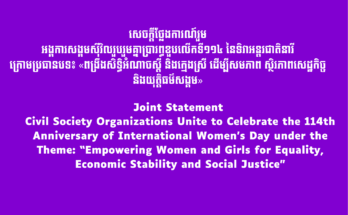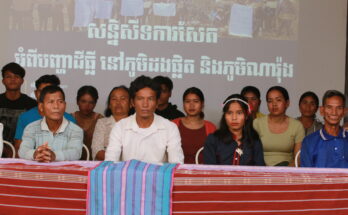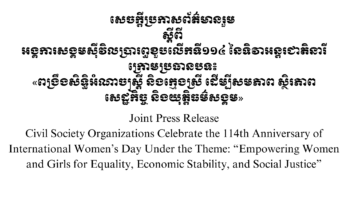International conference on the micro-justice toolkit
On the 24th-26th of October 2011 ADHOC and TISCO University co-hosted a conference on the micro-justice toolkit at the Sunway Hotel in Phnom Penh. There was great diversity among the participants with representatives from organizations based in the Netherlands, Indonesia, Egypt, Somalia, Rwanda, Kenya, Thailand, Burma and Azerbaijan. Representatives from the Cambodian based organizations Cord, YRDP and Peace Bridges took part in the conference along with students from the Phnom Penh Royal University.
Micro-justice, which often takes the form of mediation, has been used to solve conflicts in Cambodia for centuries. However, no official records have been kept and so far no set of tools for dispute resolution outside the courts has been developed in a national context. The need for alternative ways of achieving justice in the Cambodian society has not changed and therefore ADHOC is collaborating with TISCO University to develop a micro-justice facilitator toolkit in the form of guidelines for effective dispute resolution. The toolkit is meant to be a broad tool that can be applied regardless of the origin of the dispute and the cultural setting. In Cambodia the toolkit will be vital especially in dealing with marital issues and minor land disputes, as these are the kinds of cases that are most often mediated by ADHOC.
Mediation is not a court proceeding and the mediator is not a judge. The mediator is a neutral third party who facilitates the mediation process and assists the parties in reaching a decision. However, he or she has no power to make decisions on behalf of the parties and the parties’ participation in the process is completely voluntary. Mediation also differs from the official judicial process as a decision will only become final if the parties to the conflict agree on it and are willing to implement it.
In order to achieve a solution acceptable to both parties the micro-justice toolkit consists of five overall steps: meet, talk, share, decide and stabilize. Each step provides a number of specific tools that the facilitator can use during the different stages of the process. These tools have been developed with input from practitioners from all over the world and with the help of the online micro-justice workplace (http://microjusticeworkplace.net/) created by TISCO. During the conference, a series of smaller workshops were held giving the participants an opportunity to discuss the different tools. The aim of the workshops was to discuss problems and to improve the tools. Progress was definitely made as all participants enthusiastically shared their knowledge on the topic and learned from each other’s experiences.
The conference also functioned as a podium for the participants to share not only their successes but also the challenges that they face in working with micro-justice on a day-to-day basis. The delegation from Kenya for example presented their work with developing standardized rules for mediation in poor communities and especially the success that they have had with the use of helpdesks so that facilitators who had queries could easily contact someone to clarify these rules.
The conference was concluded with final remarks by organizers, followed by a field trip for the delegates to visit ADHOC offices in Kampong Speu, not far from Phnom Penh. Here participants were presented with ADHOC’s work and heard from groups of victims who had been assisted through ADHOC activities. This was an ideal way to end the conference as, after all the debate and discussion delegates were able to get a taste for what happens on the ground in human rights work in Cambodia.
In general during the discussions and activities over the three days, all representatives participated actively, offering their opinions and trying to come up with solutions to the challenges faced by their colleagues. The success of the conference was owed mainly to the participants’ diversity, as everyone learned valuable lessons from the different approaches taken in different countries. Furthermore, the conference enabled a fruitful partnership to be formed across borders – something that ADHOC and the other participating organizations will benefit from for years to come.
ADHOC staff took an active part in all the activities and left the conference with fresh ideas and motivation to continue and improve their work with alternative dispute resolution in Cambodia.



